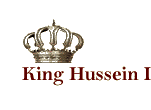 |
 |
Democracy and Human Rights Unity and Equality for All Jordanians Our most important entry into the new century should be through our strong national unity, based on cooperation and brotherhood in the framework of a young and modern state, whose cornerstones are stable institutions, whose reference is the Constitution, the law and the National Charter, and whose way is democracy, pluralism, responsible freedom, and the security and dignity of man. It is the unity that seeks to build a modern and strong society that preserves its national character and Arab identity, and is eager to work and to react with the world with an open mind. Speech from the Throne
This country, of immigrants and hosts, is based on the principles of equality in rights and duties, of tolerance, and of sacred national unity, which we hold in pride. It is one of the essential foundations of this country's strength and tenacity. True citizenship requires every member of our one Jordanian family to distance himself from any influence that may disturb it, or tarnish its purity in any way. I have stated repeatedly that anyone who seeks to undermine our national unity is my enemy until judgement day. Jordan is the nation of all Arabs. It is the refuge of all the free in this nation. True citizenship, I maintain, is to believe in this country, and to belong to it, despite all other considerations. Address to Mo’tah University
I have said this in the past and I will continue to repeat it as long as I live: Whoever tries to hurt our national unity is my enemy until the day of judgement. Remarks to the Jordanian Cabinet and House
of Representatives
We must safeguard the existing close and genuine relationship here in the Jordanian arena—all of us from every descent and origin. It is a sacred unity. When circumstances arise under which anyone would like to go his own way, this is up to him. But we will not allow the national unity to be harmed from near or far. Remarks to the Jordanian Cabinet and House
of Representatives
At the same level of importance, the honor attached to our struggle, the sanctity of our location, the strength of unity among the members of our one family regardless of origin or descent, their equality in rights and obligations in the most critically situated part of the great Arab homeland—all these are real foundations too strong to be tampered with from any quarter. Whosoever does so, in any form or shape, is deemed not to be one of us. He shall be my foe and yours until the day of judgment. Address to the Nation
At the same time, it has to be understood in all clarity, and without any ambiguity or equivocation, that our measures regarding the West Bank concern only the occupied Palestinian land and its people. They naturally do not relate in any way to the Jordanian citizens of Palestinian origin in the Hashemite Kingdom of Jordan. They all have the full rights of citizenship and all its obligations, the same as any other citizen irrespective of his origin. They are an integral part of the Jordanian state to which they belong, on whose soil they live, and in whose life and various activities they participate. Address to the Nation
The constructive plurality which Jordan has lived since its foundation, and through which it has witnessed progress and prosperity in all aspects of life, emanates not only from our faith in the sanctity of national unity, but also in the importance of Jordan's pan-Arab role. Jordan presents itself as the living example of the merger of various Arab groups on its soil, within the framework of good citizenship, and one Jordanian people. This paradigm that we live on our soil gives us faith in the inevitability of attaining Arab unity, God willing. Address to the Nation
Indeed the welcome we extended to the Palestinian refugees in Jordan was unique in the Arab world. We had made it possible for a third of the Palestinian population to become one people with the Jordanians, from the west bank of the Jordan to the east. In Jordan, the Palestinian population could, without a single restriction and simply by asking, take on Jordanian citizenship, with rights identical to those of any other Jordanian citizen in every domain: civil, political, military, etc. This was hardly the case in the other Arab countries. They were content to open their doors to the Palestinians only as refugees, with no privileges except that of living in camps until things should take care of themselves. pp. 14-15, My War With Israel,1969 |